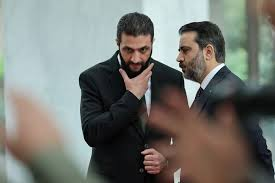The Syrian government has firmly rejected recent calls for international protection following a wave of violent unrest in the southern suburbs of Damascus, even as senior officials emphasised constructive dialogue with the United States over Syria’s future.
Speaking from New York, Syrian Foreign Minister Assaad al-Shibani hailed what he described as “constructive discussions” with American officials during a high-level diplomatic visit. He underscored the government’s commitment to national sovereignty and warned that foreign intervention—under any pretext—would only exacerbate Syria’s fragmentation and instability.
“Any call for external involvement, regardless of its justification or framing, leads only to further ruin,” Shibani wrote on X (formerly Twitter). “The path to stability lies in inclusive national dialogue, not external dictates. No force can build a strong state without the will of its people.”
His remarks came just hours after Sheikh Hikmat al-Hijri, spiritual leader of the Druze community in Suweyda, issued a public plea for international protection in light of recent violence in Ashrafiyet Sahnaya and Jaramana—two districts that witnessed one of the most serious security escalations since the fall of Bashar al-Assad’s regime. Hijri described international protection as a “legitimate right for a people devastated by massacres.”
In response, the Syrian Presidency issued a strongly worded statement rejecting Hijri’s appeal as “illegitimate” and “categorically rejected.” It accused “outlaw groups involved in acts of violence” of attempting to internationalise domestic issues.
Unfortunate Clashes
The latest wave of violence was triggered by the circulation of an audio recording in Jaramana containing alleged blasphemous remarks attributed to a Druze figure. Despite swift condemnations from prominent Druze leaders, the recording ignited outrage that led to armed attacks on state forces and escalating sectarian tensions.
Over a 48-hour period, clashes between unidentified armed groups and government forces in Ashrafiyet Sahnaya left at least 29 people dead, including 16 from the General Security Directorate. The Interior Ministry launched an extensive operation to restore control, branding the assailants as “outlaws.”
In a parallel development, Israeli fighter jets conducted airstrikes in the area, claiming to target factions allegedly preparing attacks against the Druze community. One Syrian security officer was reportedly killed in the strikes. Damascus condemned the raids as a violation of its sovereignty, while Israel defended them as preventive action aimed at civilian protection.
Amid the turmoil, Druze leaders—including Sheikhs Hammoud al-Hanawi and Yousef Jerboua, as well as Suweyda Governor Mustafa al-Bakkour—worked in coordination with Syrian authorities to de-escalate the situation. An agreement was reached to halt hostilities and limit arms possession to state forces. Government troops re-entered the area, conducted wide-scale security sweeps, and declared the district under control.
Grand Mufti Osama al-Rifai issued a televised plea for restraint, warning against sectarian incitement and revenge. “Every Syrian life is sacred,” Rifai said. “We must resist those who seek to ignite the last embers of the homeland.”
In a separate intervention, Sheikh Suleiman Abdel-Baqi, commander of the Druze group Ahrar Jabal al-Arab, accused extremist elements embedded within Syria’s security services of instigating the violence. He called for accountability and renewed coordination with the state to protect civilians and preserve Syria’s social cohesion.
FM Shibani in New York
Meanwhile, Foreign Minister Shibani stressed in New York that the crisis only underscores the need for a political solution grounded in sovereignty and internal consensus. He reiterated Syria’s demand for a complete lifting of sanctions, arguing that this is essential to allow the Syrian people to rebuild their lives with dignity.
Shibani thanked the U.S. administration for facilitating the Syrian delegation’s visit to Washington and New York. During the trip, he took part in the flag-raising ceremony for the new Syrian flag outside the UN headquarters and addressed a Security Council session on the country’s situation.
He also expressed appreciation for the support shown by UN Secretary-General António Guterres, the General Assembly, and the delegations of Saudi Arabia, Qatar, and the UAE. Shibani commended the Syrian Ministry of Foreign Affairs and acknowledged the role of Arab ambassadors, EU representatives, and members of the Syrian diaspora in advancing Syria’s diplomatic re-engagement.
As Syria navigates the delicate post-Assad transition, the events in Sahnaya highlight the persistent tensions between the imperatives of state authority, the grievances of minority communities, and the spectre of external manipulation. Whether the government’s blend of military containment and diplomatic outreach can chart a path forward remains to be seen.
 Eurasia Press & News
Eurasia Press & News




